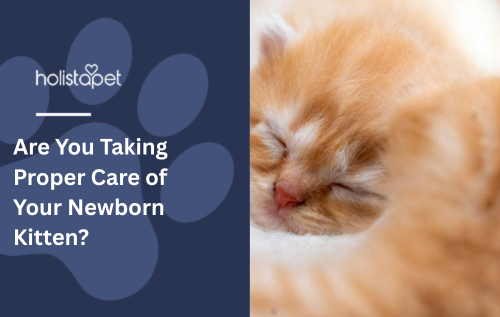Newborn kittens are incredibly fragile and require round-the-clock attention to ensure they grow up healthy and strong. Whether you’re fostering an orphaned litter or helping your cat raise her young, understanding the basics of newborn kitten care is crucial.
In this guide, we’ll walk you through everything you need to know about feeding, warmth, hygiene, and general kitten development. Let’s make sure your tiny furballs get the best start in life.
 Why Is Newborn Kitten Care So Important?
Why Is Newborn Kitten Care So Important?
The first few weeks of a kitten’s life are critical. They can’t regulate their own body temperature, they need help eliminating waste, and they require frequent feeding. Any misstep can lead to serious health issues—or worse. Providing the right environment and care can be life-saving.
Step-by-Step Guide to Newborn Kitten Care
1. Keep Them Warm
Newborn kittens can't regulate their body temperature until around 3-4 weeks old. Use a heating pad, warm water bottle, or a heated cat bed wrapped in soft blankets. Maintain a temperature of 85–90°F (29–32°C) during the first week.
2. Feeding Schedule
Kittens need to be fed every 2–3 hours, even during the night. Use a kitten milk replacer (not cow’s milk) and a small nursing bottle or syringe. Consult a vet for the correct amount based on the kitten’s weight.
Feeding tips:
-
Always warm the formula slightly.
-
Hold the kitten upright or on their stomach—never on their back.
-
Clean the bottle after every use to prevent bacteria.
3. Help Them Eliminate
After feeding, gently stimulate their genitals with a soft, warm cloth to help them urinate and defecate. They won’t be able to do this on their own for the first 2–3 weeks.
4. Monitor Weight and Development
Use a digital scale to weigh kittens daily. Healthy kittens gain about 10–15 grams per day. If they’re not gaining weight or seem weak, contact a vet immediately.
5. Keep the Environment Clean
Use clean, dry bedding and change it daily. Keep their nesting area in a quiet, low-traffic area to reduce stress.
 Frequently Asked Questions
Frequently Asked Questions
How often should newborn kittens eat?
Every 2–3 hours for the first two weeks. Gradually, you can start extending time between feedings after they turn three weeks old.
Can I feed a newborn kitten cow's milk?
No. Cow’s milk can cause digestive issues. Always use a kitten milk replacer specially formulated for their needs.
When can kittens start eating solid food?
Around 4 weeks of age, kittens can begin transitioning to a wet kitten formula or a mixture of kitten food and formula.
When do kittens start using the litter box?
Between 3 to 4 weeks old, they may begin using a low-sided litter box. Until then, you’ll need to stimulate them to eliminate waste.
What should I do if a kitten is not nursing or eating?
This is a medical emergency. A kitten that refuses to eat could be sick or weak and should see a vet immediately.
Final Thoughts
Taking care of a newborn kitten is both challenging and rewarding. With dedication, the right tools, and proper knowledge, you can help your tiny feline thrive. Every little purr, stretch, and cuddle is a testament to your effort and love.
Helpful Notes
-
Vet Checkups: Always consult a vet when taking in newborn kittens—especially if they’re orphaned.
-
Supplies You’ll Need:
-
Kitten milk replacer
-
Feeding bottles/syringes
-
Digital scale
-
Heating pad or safe warming device
-
Clean towels and blankets
-
-
Emergency Signs to Watch For:
-
Constant crying
-
Lack of appetite
-
No weight gain
-
Lethargy
-
Cold body temperature
-
Bonus Tip: Keep a kitten care journal to track feedings, weight, and milestones—it helps spot potential health concerns early and keeps you organized!


 CBD Oil for Cats - Fast Acting
CBD Oil for Cats - Fast Acting
 CBD Cat Treats - Easy Dose
CBD Cat Treats - Easy Dose
 CBD Calming Chews for Cats - Highly Rated
CBD Calming Chews for Cats - Highly Rated
 CBG Oil for Dogs and Cats - Loved by Thousands
CBG Oil for Dogs and Cats - Loved by Thousands





Leave a comment
This site is protected by hCaptcha and the hCaptcha Privacy Policy and Terms of Service apply.